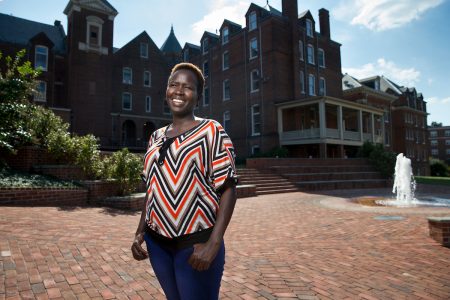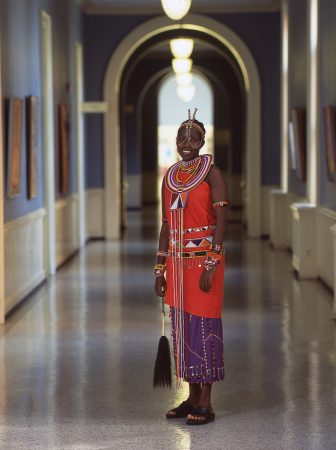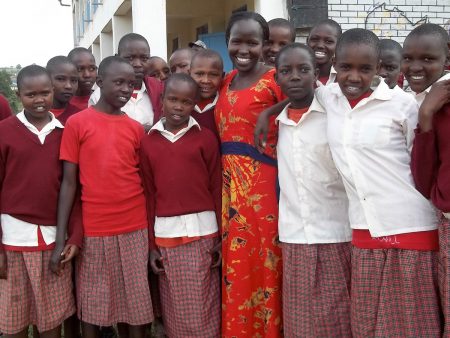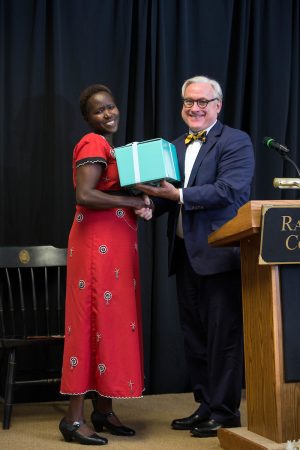Empowered by education

Kakenya Ntaiya ’04
Kakenya Ntaiya ’04 was engaged at 5 years old and expected to marry when she turned 12. Like other girls from her village in Enoosaen, Kenya, she was taught from an early age that her role in life was to be a mother. As was tradition in Maasai culture, the men in her village made decisions for all, and there were no other options for the young women.
But Ntaiya had other dreams.
Through persistence, determination, and perhaps fate, Ntaiya negotiated with her father and village elders to let her do something no other woman there had ever done—leave Kenya and continue her education in the United States.
Ntaiya was born a member of the Maasai people, whose culture is strongly patriarchal. A family’s wealth is determined by the number of cows it owns, and by those standards, Ntaiya’s family was not wealthy. Her family owned five cows and lived in a small, grass-thatched hut with no electricity, phone lines, or running water. Many nights Ntaiya went to bed hungry so that her eight siblings could eat.
Her father was a police officer and worked in Nairobi, more than an eight-hour drive from the family’s home in Enoosaen. He was only home about once a year, and when he did return, he sold the family’s possessions and abused Ntaiya’s mother.
“He treated my mother as property,” Ntaiya said. “My mother always told her daughters she did not want them to have the life she’d had.”
In school, Ntaiya made excellent grades and dreamed of becoming a teacher.
“What really attracted me to the job is that they dressed nicely,” she laughed. “That was what I wanted to be, and the only way I could become a teacher was to go to school.”
But the odds were stacked against Ntaiya in accomplishing her goal. According to the Kenyan government, only 11 percent of Maasai girls in the country finish primary school. Most leave school to get married, often before they are teenagers. Her best friend was married when they were in sixth grade, and Ntaiya herself had been promised to marry a boy from her village when she turned 12. Instead, she convinced her father to delay the marriage and allow her to finish high school. Ntaiya got her wish, but at a considerable cost.
Female genital mutilation (FGM) is a rite of passage into womanhood in Maasai culture. Girls who don’t participate in the traditional ceremony are viewed as unclean, and their families face ridicule. Those who do participate often suffer infection, infertility, or death. According to UNICEF, at least 200 million girls in 30 countries in Africa, the Middle East, and Asia have been subjected to the practice. For Ntaiya, it was the price she had to pay in order to convince her father to let her attend high school.
Ntaiya vividly remembers holding back tears as the people of her village watched an elderly Maasai woman cut away her genitalia with a rusty, unsterilized knife. The pain was excruciating for the 14-year-old, and she and she passed out after losing a significant amount of blood. Her own determination, along with secret medical attention from her mother, helped her recover in four weeks—just in time to begin high school.
“When I went through that cut, I knew it was something no other girl should have to go through,” Ntaiya said. “I knew that despite the fact I was told not to talk about it, I needed to talk about it. I knew that it was wrong, just like something in me knew that when a girl is married at 12 years old, that’s wrong.”
Ntaiya continued to earn high marks in high school and was accepted to a teachers’ college in Kenya. But one day, she met a neighbor who had attended the University of Oregon and knew the president of a school in Virginia called Randolph-Macon Woman’s College (now Randolph College). He helped Ntaiya develop her English-speaking and writing skills and assisted her in applying to the College. Though she was accepted and earned a scholarship that covered her tuition, many obstacles remained. She needed money for her flight across the Atlantic, as well as for a passport and visa.
Ntaiya’s family was not able to help with the costs, so she turned to her village, determined to convince the male elders to help her become the first woman from the village to attend college. They had never allowed a woman to leave, much less travel abroad, and Ntaiya had to gain the support of all the elders in her village before they would provide the necessary funds. Once again, Ntaiya was forced to negotiate, and she promised to return to her village and use the education she would receive to make a difference there.
“I told them that I never wanted to abandon them,” she said. “They fundraised so that I could come here, and my life changed at R-MWC. I was one of the luckiest international students at the school.”

Kakenya Ntaiya ’04, when she was a student, dressed in a traditional Maasai outfit for a cultural event at the College.
Ntaiya soon learned the challenges were not over. The 20-plus-hour flight to the United States was her first, and Ntaiya spent most of the journey sleepless and tightly gripping her seat’s armrests. Alone in a new country, Ntaiya found herself struggling to adapt to a new culture and lifestyle that was nothing like she was used to. The food and weather were different, and she had never experienced the personal freedoms allowed for her classmates. Still perfecting her English, Ntaiya had to learn how to use computers and the Internet for her coursework. She specifically remembers numerous sessions using a software program that taught her how to type. She turned to her new R-MWC friends, however, for lessons in American culture.
Ntaiya’s roommate, Katherine Flansburg Cabrera ’03, taught her how to use the showers and washing machines in their residence hall. She introduced Ntaiya to the most popular TV shows and movies, and shared her love for country music. Cabrera was the one Ntaiya went to when she felt homesick or overwhelmed. “I found in Kathy a sister to whom I could go and be very vulnerable and tell her how I felt,” Ntaiya said.
Cabrera has many fond memories of being Ntaiya’s college roommate. She specifically recalled Ntaiya’s dislike of raw vegetables and cold foods, and how she would heat her orange juice in the microwave in the dining hall each morning. Cabrera said she and her friends playfully teased Ntaiya for her eating habits, but she was always a good sport.
“She was kind and open with everyone,” Cabrera said. “If she was annoyed or embarrassed she did not let it show. I remember everyone loving her and wanting to help her and be close to her.”
The two roommates even became part of each other’s families. Ntaiya accompanied Cabrera home to Florida for Thanksgiving break in 2000, where Cabrera’s cousin taught her how to ride a bicycle. In 2003, Cabrera had the opportunity to visit Ntaiya’s village and stay with her family, where she had the “richest, best drink” she has ever tasted—warm sweet tea, made with fresh, whole milk from one of the Ntaiya family’s cows.
Now a real estate broker in Texas, Cabrera and Ntaiya have kept in contact since graduation and remain close friends.
“I have known from the first moment I met Kakenya that she would mix with influential people and accomplish great things,” Cabrera said. “She has a force and a presence that draw people to her and make them want to fight with her and for her. I have never known anyone else who has the charisma nor the drive that Kakenya has. Her flame burns very, very bright.”
Despite the many cultural barriers and adjustments to life in America, Ntaiya continued to succeed in the classroom at R-MWC. She arrived at the College planning to major in economics in order to become a banker, but the liberal arts curriculum helped Ntaiya discover a different, stronger passion for International studies and political science. She was especially inspired by International Studies professor Jennifer Dugan’s courses, where she learned about the United Nations, the African Union, and human rights. She also learned that FGM was now illegal in Kenya, but she knew it was still happening every day.
Dugan recalled Ntaiya’s curiosity in the classroom, as well as her adjustments to life on campus.
“When I first met her, she was still getting used to so many changes in climate, geography, community, and all the rest,” Dugan said. “I remember her describing to our class the ‘bathroom facilities’ that the Maasai people use as compared to the walled stalls in the campus bathrooms. Even in her adjustment, Kakenya taught us a lot.”
While studying international studies at R-MWC, Ntaiya participated in the National Model United Nations (NMUN) in New York City, where students from colleges across the country act as delegates for member countries of the UN. Ntaiya remembers hearing statistics like, “in the next decade, 3 million girls will be victims of FGM,” and “in the next year, 142 million girls will be married before turning 18.” To most of the young men and women at NMUN, these were just numbers. A survivor herself, Ntaiya saw the childhood friends and neighbors who would never have a chance to have, much less achieve dreams.
After earning an international studies and political science degree from R-MWC, Ntaiya was hired as a youth advisor for the UN Population Fund (UNFPA). In that role, she traveled the world to speak out about issues and obstacles that prevented youth, especially young girls, from reaching their full potential. She then earned her Ph.D. in education policy and administration in 2011, from the University of Pittsburgh. While enrolled in graduate school, she met and eventually married Michael Mugoh, another Kenyan living in the United States. The couple has since had two children.
Ntaiya kept her word to her village and returned to Enoosaen as frequently as she could. During those visits, she worked to gain their support for a boarding school for girls. Though she had almost no money and no guaranteed financial assistance from her neighbors, in 2009, Ntaiya began building the school that would become the Kakenya Center for Excellence.
“I didn’t care if the girls had to spend their first year learning under trees rather than in classrooms,” she said. “I didn’t want to wait any longer to start building my dream and allowing the girls in my community to pursue their dreams.”

Kakenya Ntaiya ’04 with some of the students from the Kakenya Center for Excellence
Fortunately, with the assistance of the nonprofit Kakenya’s Dream, the school has grown into a full campus that includes classrooms, a dormitory, teachers’ housing, and a cafeteria. Enrollment has grown from 30 students to 278 as of this spring. The school’s test scores rank among the highest in the country, and it has received an increasing amount of international attention. One of the school’s students even got to meet U.S. President Barrack Obama during his visit to Kenya in 2015. Ntaiya is still dreaming, however. She plans to raise enough money to build another school and increase enrollment to about 600.
Ntaiya is now using education and the school’s influence on the local and national community to advocate for women’s rights, while also working to put an end to FGM and child marriages. Parents of students who attend the Kakenya Center for Excellence must agree never to subject their daughters to FGM, and students cannot get married until they graduate from high school. The school also educates parents about the dangers of FGM and ensures that students are taught their rights as women.
“When we take in the girls at 9 or 10 years old, they are very timid, scared, and have little hope in their lives,” Ntaiya said. “They believe that they’ll probably be married by the time they’re 13 years old. They believe their future is very dark, and we take them and give them an opportunity to realize their dreams.”
Though the school has been supported and viewed favorably by most in the community, it has faced some opposition from members of the community who still embrace the traditional, patriarchal values.
“The most challenging part of my job is that social change takes time and can be a road fraught with opposition and setbacks,” Ntaiya said. “We are working to change practices that have been in place for many generations. I have experienced plenty of pushback, and this can be discouraging. But we have come a long way already, and the change that is taking root in the community is undeniable.”
Ntaiya has received multiple international recognitions for her efforts. In 2013, she was named one of CNN’s Top 10 Heroes, earned the Global Women’s Right Award from the Feminist Majority Foundation, and was recognized by the Women of the World as a “Woman of Impact.” In 2015, she received one of her alma mater’s highest honors when she was presented an Alumna Achievement Award.
Upon accepting the award, Ntaiya credited much of her success and her passion for social justice to the education she received at R-MWC.
“I think who I am was basically built when I was here because I had never found a place like this,” she said. “I came from a very poor village to this university, and it was the first place that showed it believed in me and showed me that I could become a leader.”

Kakenya Ntaiya ’04 receives an Alumnae Achievement Award from Randolph President Bradley W. Bateman in 2015.
Dugan, one of the professors who encouraged and mentored her along the way, was one of many friends Ntaiya embraced after accepting the award on campus last fall.
“Kakenya’s example teaches us that determination and focus can help improve the human condition,” Dugan said. “She shows us that we have obligations to our communities and that effective, positive change takes hard work and sustained partnerships. She also demonstrates that liberal arts education is a platform for building the skills and capacities to be an inspirational leader.”
The College became coed and changed its name to Randolph College just a few years after Ntaiya graduated. But she believes the College’s mission to produce graduates who engage the world critically and think creatively remains very much intact. As part of her visit when she accepted the award last fall, Ntaiya discussed social justice and shared more inspiring stories about her educational experience with current students. Tahan Menon ’16, an economics and political science major, said he was struck most by Ntaiya’s humble, yet awe-inspiring personality. Like Ntaiya, Menon plans to return to his native India after graduation to join a broad, growing movement by the nation’s youth to bring about positive change.
“The story of her life forced me to consider certain areas in my own life where I was complacent and to realize that small, continuous steps combining my education with practical initiatives is important and rewarding,” Menon said. “I think Kakenya’s example proves that Randolph prepares you for far more than just a job, but rather a more empowering and rewarding way of living.”
Now in Kenya, Ntaiya is helping a new generation of girls from her country become leaders. In five years, she hopes her school will become a model for girls in grades K-12 that can be replicated in other rural areas of Kenya. In 10 years, she hopes to have ended FGM in her community and to have developed a new generation of young female leaders who will continue to create change for those who follow.
“The best weapon you can give a young person is an education,” she said. “What keeps me going is the change that I see in the lives of these girls. It’s what gives me hope.”
Tags: alumnae, alumnae accomplishments, alumnae achievement awards, kakenya ntaiya
